
|   |

|   |
 e-mail: leelakaverivenkat@gmail.com Grandeur of Kathakali which never fails to awe Photos courtesy: Kalakshetra December 29, 2021 For the 'Kathakali branthan' sold to the grandeur of Kathakali, no other art form can stand in comparison to what is in reality, a larger than life visualisation through dance and drama. And amongst the reputed plays forming the repertoire of this art form, 18th century writer Unnayi Warrier's attakatha Nalacharitam takes pride of place. It occupies,amongst Kathakali attakathas according to many scholars, the same place that Kalidasa's Shakuntalam does as the masterpiece of Sanskrit literature. With roots in the first millennium BCE, the story of Nala, extensively dealt with in Sanskrit literature, appears in the Mahabharata as a tale within the main plot. It is also mentioned in the Silappadikaram, and it has been treated in many of the regional language literatures - each investing the story with its own flourishes and twists. Unnayi Warrier's treatment in Nalacharitam accenting on the love story of Nala and Damayanti, depicts true love transcending and triumphing over the most severe of odds. Known as this play is for its poetic excellence, Kathakali performers of Nalacharitam have revelled in projecting varied interpretative insights into the lyrical delight of Unnayi Warrier's gift with words. 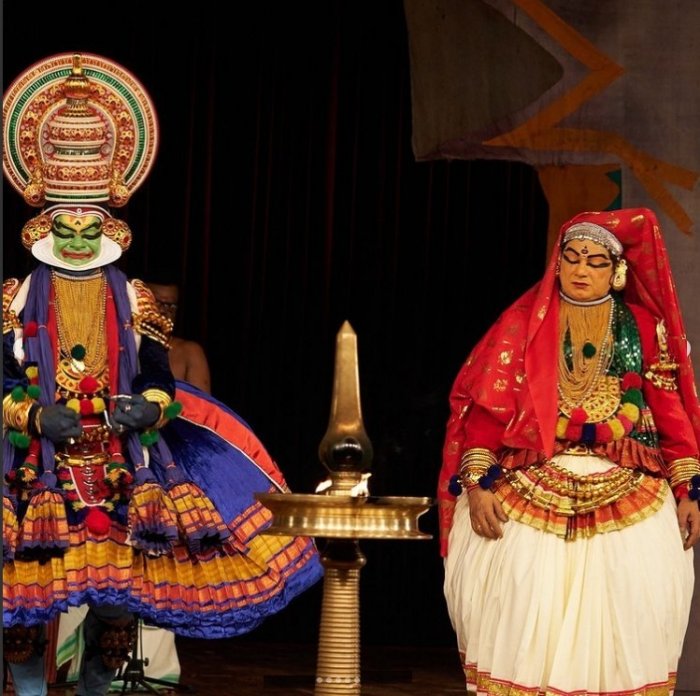
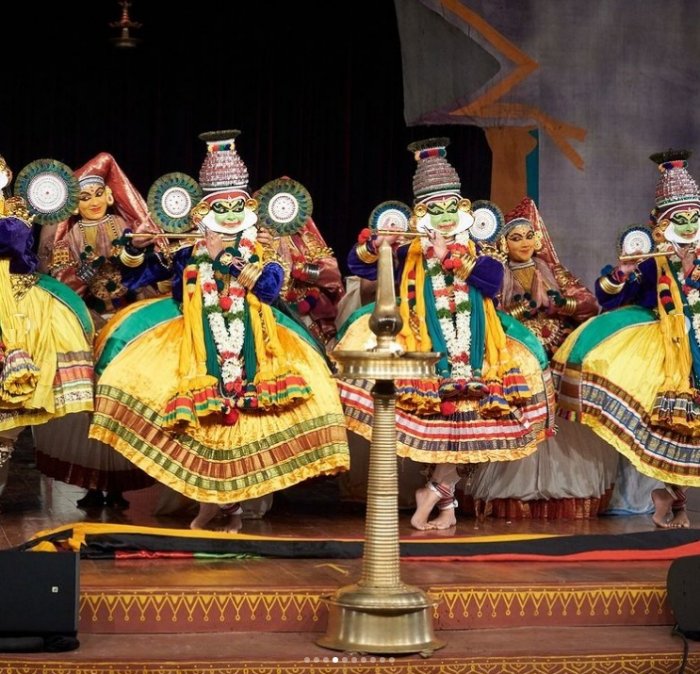
For Kalakshetra's three day Kathakali festival Bhava Bhavanam Anubhavam, the first day's presentation comprising scenes from the 4th part of Nalacharitam, had its curtain raiser in a neatly rendered Purappadu invocation by dancers of Kalakshetra. In full regalia, with three in male costume and two in streevesham, each of the latter positioned, slightly at the back, inbetween two males, made for visual aesthetics along with the impeccable uniformity in presentation. The crowning glory of the evening's Kathakali came from two aspects, one the vintage performance of eighty year old maestro Dr.Sadanam Krishnankutty as Baahukan/Nala and the second, the unbelievable singing by Kottakkal Madhu and Sadanam Sivadas. With its slow paced Sopanam style of rendition, singing for Kathakali demands phenomenal voice control and sense of timing, and the two vocalists combining exquisite melody in equal measure with intense feeling provided inspirational accompaniment for the performers. Nala, stripped of kingdom, possessions and separated from beloved wife Damayanti thanks to the machinations of Kali, is serving as charioteer for Rituparna. Action begins from the point, when steered by charioteer Baahukan, Rituparna in double quick time, reaches the perplexingly quiet palace of Bhiman - sans any of the expected hustle and bustle, for the very significant event of Damayanti's second marriage. Astute, and full of the deep insight of love, Damayanti, watching Rituparna's chariot arrive at such speed, is convinced that the charioteer could be none other than her husband Nala. But intrigued by the unprepossessing looks of the charioteer Baahukan, she asks Kesini to closely watch the actions of the man in the palace guest house. Poignantly telling her confidante Kesini about her virahakathoram (intense pangs of separation) with no news of husband Nala, Damayanti, whose interests are now roused, requests Kesini to closely watch the activities of Baahukan (teertum sandegam ellam... en tozhi), so that all her doubts about his identity, could be set to rest. Kalamandalam Rajasekharan in streevesham as Damayanti, while very communicative, this critic was struck by how the actor Kalamandalam Adithyan as Kesini held himself - with literally no action in what was a long scene, without in any way taking away audience attention from the main actor Damayanti, while forming a very attentive part of the scene with Damayanti. In the next scene between Baahukan and Kesini, the former insists on knowing what business has brought Kesini to him, a charioteer. Kesini tries to impress upon him how desolate Damayanti has been with the loss of Nala, and asks whether he knows anything of Nala's whereabouts - upon which Baahukan (while secretly exulting that Damayanti still longs for him) replies in the negative - further adding that one planning to marry again cannot lament on the earlier husband. Kesini tells him that talk of a second marriage cannot be true, but Baahukan insists that what he has witnessed being mentioned among several common people (Palarilla loka satchigal) can hardly be false. Taking leave of a stricken Baahukan struggling to hide his feelings at the supposed remarriage of his wife, Kesini covertly watches his actions unseen. She is amazed to see the charioteer (blessed with a boon) cooking a meal without fire and bringing dead flowers to life with a touch of his hand. All these actions totally improvised with manodharma by the masterly Sadanam Krishnankutty and rendered to the sensitive chenda percussion of Kalamandalam Unnikrishnan, were brilliantly communicative without words. Kalasams in keeping with the general tone of the situation and mood, were executed with a verve belying an actor of eighty years. Maddalam support was by Kottakkal Ravi. Kesini reports back to Damayanti that what she has seen of Baahukan adds up to one of noble qualities, though he certainly does not resemble Nala in appearance. But now certain after hearing of his feats that it is indeed her husband, Damayanti goes to Baahukan who is both broken, seeing her anguish, while also angry about her decision to marry again. Draping round him the holy cloth given by Karkotakan, Baahukan regains his former appearance as Nala, and starts abusing Damayanti on her plans of defying her marital vows, in the teeth of earnest efforts by her at trying to convince him about the news of remarriage being used as a ploy to locate him. Finally an aerial voice as an oracle from Vayu Bhagavan clarifies that Damayanti is a chaste wife and has committed no wrong, upon which, Nala embraces his long lost wife and all is well. Fresh perspective on Soorpanaka 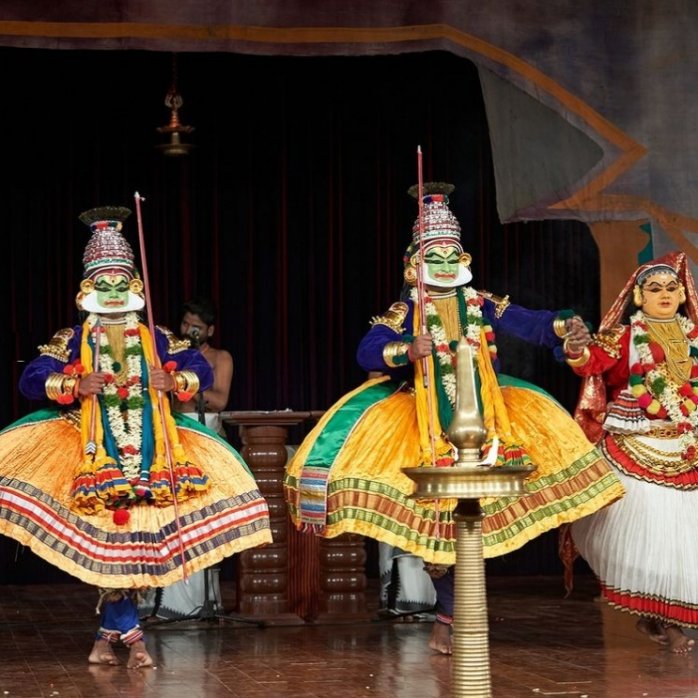
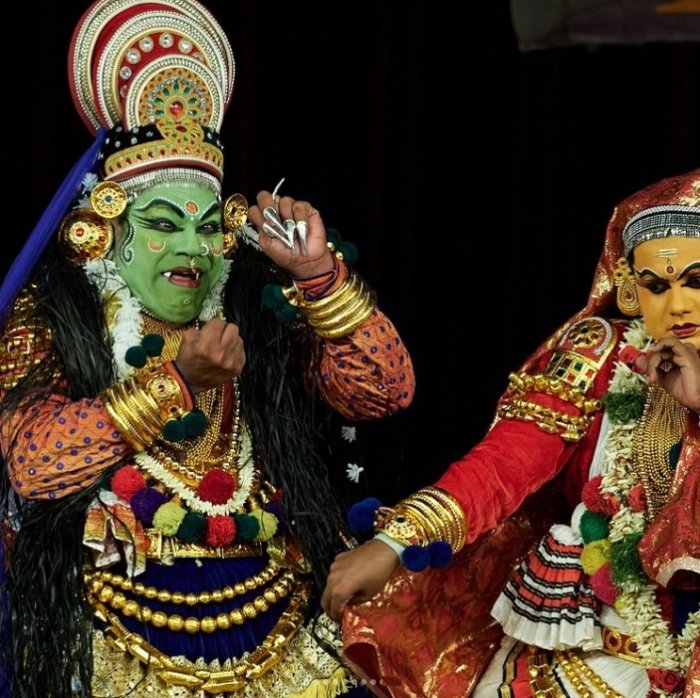
The second evening's presentation Soorpanakangam by Gandhi Seva Sadanam Kathakali and Classic Arts Academy of a recent work conceived and directed by Dr. Sadanam Harikumar, looks at Ravana's sister from a unique prism at variance from the usual portrayals based on works like that of Kottara Tamburan. The locale of the play is Panchavati, as Rama and Sita enter holding hands with Lakshmana on one side of Rama. Vasanta gaanam, kokilam, mandamarutham speak of the beauty of Spring as Lakshmana starts getting busy to erect the Paramashala, the shelter to house the three of them in the forest. The next scene, starting with a tiranokku (wherein the character from behind the tiraisheela tantalisingly plays with the curtain with his hands and tassel ends of the uttareeyam, gradually revealing himself) has Sambhu Kumar, the son of Soorpanaka, making his entry after intense penance to acquire a boon from Shiva. His eyes fall on the handsome brothers Rama, Lakshmana, and their getup makes him wonder if they are sons of rishis or celestials (Muni kumararo, Yamadevagalo). Sita meanwhile, bathing in the waters flowing by, has a sixth sense of eyes watching her, and she mentions this to Lakshmana guarding the area. Unable to see anyone close by, Lakshmana hacks branches of the tree near the water, and spots Sambhu Kumar, who is watching, mesmerised by the beauty of Sita - particularly her torso above the water which holds him enthralled. Enraged by the way he is casting eyes on one he worships as his mother, Lakshmana challenges Sambhu Kumar to battle, and kills him in the encounter. He then strips the jewellery on the body as proof to place before anyone, who may make enquiries. It is at this point that Soorpanaka, in pacha makeup on face (meant for aristocratic figures) enters, and her eyes are riveted by the regal and handsome brothers - both equally arresting - making it difficult to choose between them. Her advances to both are repulsed, and in course of time she is informed that her son is no more. Refusing to believe that her son could be overcome in battle, she breaks down when shown the jewels which were on his person, as proof. Grieving later for her slain brother Ravana, Soorpanaka in a final exchange with Rama, wondering if love is a sin for which she has been punished, losing both son and brother - Rama consoles her promising that in his next life, without his 'ekapatni' vrat (oath to have one wife only), he will be born as charmer Krishna with interludes with many women. And Soorpanaka who will take birth as Kubja, the hunchback, will have her redemption, by winning her lover Krishna. The work was full of verve and strong kalasams. Harikumar, the director himself in the role of Soorpanaka, did full justice to what is a uniquely sympathetic version of Soorpanaka. He had good support in Sadanam Manikantan as Sambhu Kumar. Kalamandalam Arun Raj as demure Sita, Sadanam Vipin Chandra as Rama and Akshay as Lakshmana fitted the respective roles. The music in several ragas Hamir Kalyani, Beghada, Suratti etc was rendered by Sadanam Jyotish Babu and Sadanam Vignesh Harikumar, the vocalists, with Sadanam Ramakrishnan and Sadanam Jithin on chenda and Sadanam Devadoss on maddalam. 
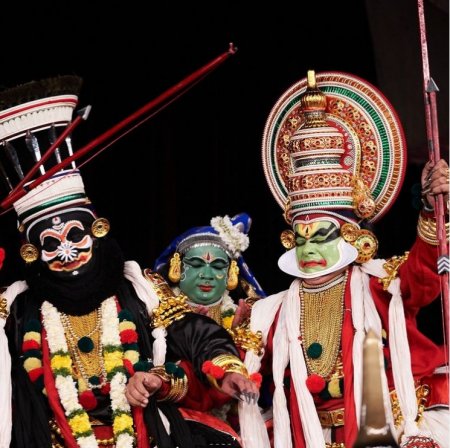
The last evening's fare began with Thodayam, rendered by the junior students and as is the convention, the performers were not in costume as for the Purappadu, barring the chain ornaments round the neck, and were turned out in their customary practice getup. With a prayer to Ganesh, Vishnu, Shiva and Goddess Parvathi, the accent was on nritta. The play staged for the evening Kiratam, based on a story from Aranyaparva of Mahabharatam, is composed by Irattakkulangara Rama Warrier, who lived in the first half of the 18th century. The locale is Kamayaka forest where the Pandavas are taking shelter after being cheated of their kingdom in exile. Following deep penance to Shiva, Arjuna, attacked by a wild boar Mookasura (actually a messenger of Duryodhana in disguise), fells the boar with his arrow, which coincides with Shiva's (disguised as a hunter with Parvathi as huntress) arrow also hitting the same target. Both have a tussle over whose prey the boar is, and Arjuna finds himself unequal to the hunter. Later to his amazement, Arjuna finds that the flowers he offers the Shivalinga in the temple descend on the neck of the hunter. Realising that it is divinity he is confronting, Arjuna falls at his feet and Shiva blesses him with the special Pashupata astra. This production, unlike the lyricism of poetry in Nalacharitam, is based on an earthy language with Shiva and Arjuna pitted at each other, using slang like "poda nee mudha" (which would translate into "Begone you dunderhead"!) The music sung by Kottakkal Narayanan and Vengeri Narayanan, had a fast, clipped, almost recitative quality - evoking, at times, a feel of belligerence, with few soft touches. Kalamandalam Balasubramaniam as the Kattalan (hunter) and Kalamandalam Prashanth as Arjuna were evocative in the main roles. Jishnu, Rupesh and Malavika appeared as Mookasuran, Lord Shiva and Parvathi. In streevesham, as the hunter's wife (Kattalashree) was Praveen Kumar. The play has very strong kalasams (nritta interludes) with percussion by Kalamandalam Unnikrishnan on chenda and Kottakkal Ravi on maddalam. Altogether a fine three day peep into Kathakali! Kshaatraa Baalaa 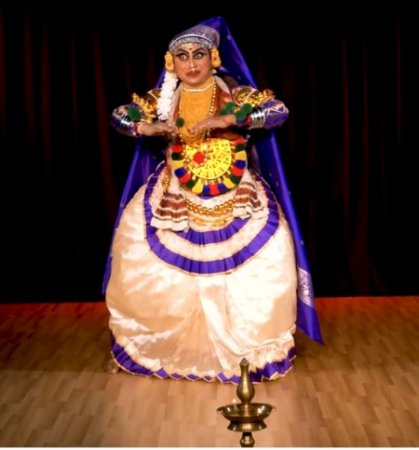
Prabal Gupta Almost co-eval with this festival was South Zone Cultural Centre sponsored Kathakali evening, featuring Prabal Gupta in streevesham, in a new work conceived by him, to fit into the 'Azadi ka Amrit Mahotsav' series, on 'Desh bhakti'- paying homage to the brave soldiers who sacrifice their lives for the freedom of the country, along with a deep sense of gratitude for the courage of the women and families they leave behind. The entire purpose could have ended in some sentimental didacticism, but for the intelligent coming together of experienced people like Arjun Bharadwaj whose libretto in Sanskrit along with soul stirring music composed by Jyotish Babu really create a dignified foundation for the dancer to build on. And with Guru Sadanam Balakrishnan for guidance in choreographing the performance, what ultimately comes out, given Prabal's own capacity for emotive expression (which however needs to be kept within aesthetic control without going overboard) is a worthwhile effort. And with very mood relevant kalasams and nritta between sahitya passages thoughtfully selected, there is an aesthetic counterpoint for interpretative parts in the pure dance punctuations. Lilting Dhanyasi tones set to Chempada tala, usher on to the stage, a young, newly married wife reminiscing on the ecstasies of her bridal night -with the second charanam line "madhusprasham unmada harsham" in Brindavana Saranga, which with its suggestively erotic sringar is treated at some length by the dancer. While languishing in aloneness, with the husband called away on duty immediately following the first joys of togetherness, the bride takes solace with pride in the fact that her young husband is involved in fighting for the nation's freedom by destroying its enemies - "dushta sikshanam desha rakshanam" (set to Chempada in raga Abheri). Even as she imagines her husband's valour on the battle field, she is disturbed by the twitching experienced in her left eye (sphurati kil mama vametara netram - set to raga Athana in Chempada). On receiving the news that all the brave men have died in battle (mrita sarve veera yodha), the young widow lamenting her fate "ha ha daruna vidhae" in anguished anger discards the symbols characterising a sumangali like the vermilion mark, the bangles etc and decides to commit sati - till suddenly, and (here the music changes to Kedaragowla) with wiser sense prevailing, comes the realisation that birth and death are but inseparables of life. She understands that instead of giving in to defeatism by doing away with herself, her duty is to carry on the good work of her husband and save the nation (Kshatra parvata rakshitam). Vande mataram in raga Desh makes for a moving finale. Apart from the courage to try something totally new (though the subject of martial courage fits in with the Kathakali ambience), one must commend the very aesthetic costuming sense Prabal Gupta has. 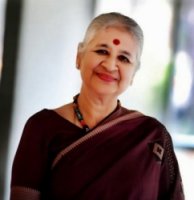 Writing on the dance scene for the last forty years, Leela Venkataraman's incisive comments on performances of all dance forms, participation in dance discussions both in India and abroad, and as a regular contributor to Hindu Friday Review, journals like Sruti and Nartanam, makes her voice respected for its balanced critiquing. She is the author of several books like Indian Classical dance: Tradition in Transition, Classical Dance in India and Indian Classical dance: The Renaissance and Beyond. Post your comments Pl provide your name and email id along with your comment. All appropriate comments posted with name and email id in the blog will also be featured in the site. |